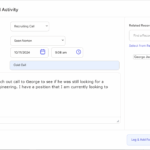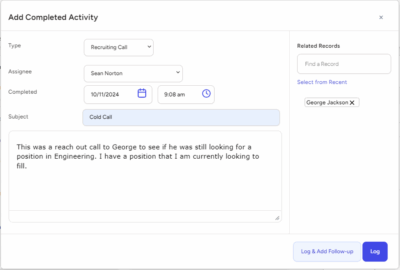You’ve been there before. You spent weeks and weeks recruiting on an assignment, and now you’re sitting there, scratching your head and wondering why your client doesn’t call you back from any of the three messages you’ve left.
Remember the first cardinal rule of human behavior? “People only do what is in their own best interests.” If that red-hot client turned into a lukewarm message-returner, then there’s some sort of reason why he isn’t calling you back.
If you’ve spent time on the search, have candidates that you want to present, and you’ve left three messages (and assuming you know that he is not on vacation, not traveling, nor going through a medical emergency), then leave a message that goes something like this:
“Bob, I know you said a few weeks ago that if I came across a [position title], that you would want to interview with them quickly. I finished the candidate recruitment phase of my search and have three viable candidates who I think you would get excited about. If I don’t hear from you by Friday at noon (two or three days away), I’ll just assume that the position’s been filled and will tell them that and will release them. If I can ever help you again in the future, please don’t hesitate to call.”
If the client is still interested, he’ll call you. If he’s already filled the position, he won’t. Either way, you’ll have your answer.
I told a recruiter this once and he asked me, “But won’t your clients get mad at you if you leave that sort of message?”
Does it really matter at this point? They don’t seem to be a good client if they’re not returning calls. You’re already not getting business from them, so what does it matter?
If they get mad, then they can get mad at some other recruiter who’s going to waste their time turning over rocks trying to feed a monkey that isn’t even hungry anymore. Why would a client get mad if (a) you’ve covered the market and have brought them three possible solutions to their problem, and (b) you’ve left the professional courtesy of three messages with nary a return phone call?
Seriously, I doubt a client will get mad. More than likely, they’ll be embarrassed. It’s not like you’re trying to guilt-trip them into compliance.You’re just giving them a deadline.
Always assume the benefit of the doubt and respond gracefully when they do call you back. If the client is busy and slow to respond, then you need to address this issue:
“Bob, I understand you’re busy. But I want you to know that I pace the rhythm of my search work based on the priorities of my clients, and if it doesn’t seem like a priority to you, then I can’t make it one, as well. But if it is, then I’ll put you at the very front burner of my desk. All I ask for in return (principle of reciprocity) is that you return my calls on the same day or the next day. That’s because (always say this to increase compliance) the only time I’ll ever need to talk to you is if (1) I need more information on the search, and (2) I have a candidate with an expiration date who can solve your problem, and I would really hate for you to lose out on someone so rare and valuable (principle of scarcity). Are you okay with that, Bob?”
Always tell people why it will benefit them to increase the probabilities of compliance. And in this phrasing, the reasons for them to call you back are all about them, them, them . . . NOT you, you, you. They don’t care if you might lose out on a fee. They don’t care about your manager breathing down your back, so don’t even go there with them. Go there with how their quick response will benefit them.
Remember that the recruiting game is a game of probabilities and is more about influence than control. Leverage these principles to your advantage and see how much easier it is to lead your clients through the process, which ultimately benefits them.

— — —
Scott Love, guest writer for the Top Echelon Recruiter Training Blog and owner of The Attorney Search Group, trains, motivates, and inspires recruiters to achieve greatness in the profession. Visit his online recruiter training center for tips, downloads, videos, and articles that can help you increase your recruiter billings.








